
41 Results




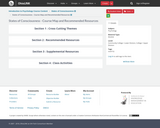
How to Use this GuideThis guide provides information and resources on state of consciousness for an Introduction to Psychology course. All resources are Open Access and can be downloaded or added to a Course Management System (LMS) via the hyperlinks. IntroductionThis section will explore states of consciousness with significant discussion on sleep. However, other altered states of consciousness due to psychoactive drugs, hypnosis, and meditation will be reviewed.According to the APA recommendations and Ohio TAG, this chapter also falls within Pillar 1 (Biological). This chapter is considered “optional” under the Ohio TAG, which requires Biology of Behavior and either Consciousness or Sensation to satisfy the requirements for Pillar 1: Biological. If you select to cover this chapter as your second topic within Biological, consider emphasizing the biological aspects of consciousness including the biology of consciousness and sleep, and the biological effects of drugs on consciousness (e.g., drugs as agonists and antagonists).
- Subject:
- Psychology
- Material Type:
- Module
- Date Added:
- 07/11/2018




- Subject:
- Psychology
- Social Science
- Material Type:
- Unit of Study
- Provider:
- Ohio Open Ed Collaborative
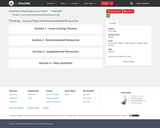
How to Use this GuideThis guide provides information and resources on introducing the topic of thinking and cognition. All resources are Open Access and can be downloaded or added to a Course Management System (LMS) via the hyperlinks.IntroductionThinking is one of the smaller topics that make up cognitive psychology (along with perception, attention, intelligence, and memory). Faculty may want to first introduce Cognitive Psychology and discus how thinking fits into all the other areas. This topic lends itself to several in-class activities to emphasize the different concepts. Faculty may also want to pair this section together with Intelligence and language development.
- Subject:
- Psychology
- Material Type:
- Module
- Date Added:
- 07/11/2018
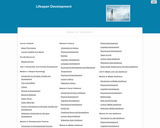
Welcome to the study of human growth and development, commonly referred to as the womb to tomb course because it is the story of our journeys from conception to death. Human development is the study of how we change over time. Although this course is offered in psychology, this is a very interdisciplinary course. Psychologists, nutritionists, sociologists, anthropologists, educators, and health care professionals all contribute to our knowledge of life span.
- Subject:
- Psychology
- Social Science
- Material Type:
- Full Course
- Provider:
- Lumen Learning
- Provider Set:
- Candela Courseware
- Author:
- Linda Overstreet
- Date Added:
- 02/28/2018

Developmental Psychology, also known as Human Development or Lifespan Development, is the scientific study of ways in which people change, as well as stay the same, from conception to death. You will no doubt discover in the course of studying that the field examines change across a broad range of topics. These include physical and other psychophysiological processes, cognition, language, and psychosocial development, including the impact of family and peers.
- Subject:
- Psychology
- Social Science
- Material Type:
- Textbook
- Provider:
- College of Lake County
- Author:
- Martha Lally
- Suzanne Valentine-French
- Date Added:
- 01/01/2017

Cognitive science arose in the 1950s when it became apparent that a number of disciplines, including psychology, computer science, linguistics, and philosophy, were fragmenting. Perhaps owing to the field’s immediate origins in cybernetics, as well as to the foundational assumption that cognition is information processing, cognitive science initially seemed more unified than psychology. However, as a result of differing interpretations of the foundational assumption and dramatically divergent views of the meaning of the term information processing, three separate schools emerged: classical cognitive science, connectionist cognitive science, and embodied cognitive science.
- Subject:
- Psychology
- Social Science
- Material Type:
- Textbook
- Provider:
- Athabasca University
- Author:
- Michael Dawson
- Date Added:
- 01/01/2013
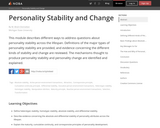
This module describes different ways to address questions about personality stability across the lifespan. Definitions of the major types of personality stability are provided, and evidence concerning the different kinds of stability and change are reviewed. The mechanisms thought to produce personality stability and personality change are identified and explained.
- Subject:
- Psychology
- Social Science
- Material Type:
- Module
- Provider:
- Diener Education Fund
- Provider Set:
- Noba
- Author:
- David Watson
- Date Added:
- 02/28/2018
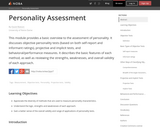
This module provides a basic overview to the assessment of personality. It discusses objective personality tests (based on both self-report and informant ratings), projective and implicit tests, and behavioral/performance measures. It describes the basic features of each method, as well as reviewing the strengths, weaknesses, and overall validity of each approach.
- Subject:
- Psychology
- Social Science
- Material Type:
- Module
- Provider:
- Diener Education Fund
- Provider Set:
- Noba
- Author:
- David Watson
- Date Added:
- 02/28/2018
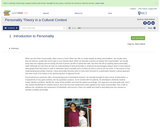
Written by Lansing Community College Psychology professor Dr. Mark Kelland, this book covers general personality theory, with an emphasis on cultural aspects affecting personality development. There is also a section focusing on making positive choices in the development of one's personality from a number of different cultural/philosophical perspectives.
- Subject:
- Psychology
- Social Science
- Material Type:
- Diagram/Illustration
- Textbook
- Provider:
- Rice University
- Provider Set:
- OpenStax CNX
- Author:
- Mark Kelland
- Date Added:
- 11/04/2015

This textbook provides standard introduction to psychology course content with a specific emphasis on biological aspects of psychology. This includes more content related to neuroscience methods, the brain and the nervous system. This book can be modified: feel free to add or remove modules to better suit your specific needs.Please note that the publisher requires you to login to access and download the textbooks.
- Subject:
- Psychology
- Social Science
- Material Type:
- Textbook
- Provider:
- Diener Education Fund
- Provider Set:
- Noba
- Author:
- Ed Diener
- Robert Biswas-Diener
- Date Added:
- 04/27/2020
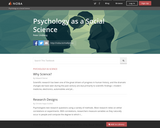
Provides standard introduction to psychology course content with a specific emphasis on social aspects of psychology. This includes expanded content related to social cognition, aggression, attraction and similar topics.
- Subject:
- Psychology
- Social Science
- Material Type:
- Textbook
- Provider:
- Diener Education Fund
- Provider Set:
- Noba
- Author:
- Ed Diener
- Robert Biswas-Diener
- Date Added:
- 01/01/2015
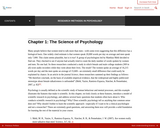
The present adaptation constitutes the second Canadian edition and was co-authored by Rajiv S. Jhangiani (Kwantlen Polytechnic University) and I-Chant A. Chiang (Quest University Canada) and is licensed under a Creative Commons Attribution-NonCommercial-ShareAlike 4.0 International License. Revisions include the following:
- Subject:
- Psychology
- Social Science
- Material Type:
- Textbook
- Author:
- I-Chant A. Chiang
- Rajiv S. Jhangiani
- Date Added:
- 04/27/2020
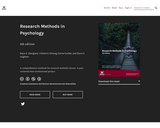
This fourth edition (published in 2019) was co-authored by Rajiv S. Jhangiani (Kwantlen Polytechnic University), Carrie Cuttler (Washington State University), and Dana C. Leighton (Texas A&M University—Texarkana) and is licensed under a Creative Commons Attribution-NonCommercial-ShareAlike 4.0 International License. Revisions throughout the current edition include changing the chapter and section numbering system to better accommodate adaptions that remove or reorder chapters; continued reversion from the Canadian edition; general grammatical edits; replacement of “he/she” to “they” and “his/her” to “their”; removal or update of dead links; embedded videos that were not embedded; moved key takeaways and exercises from the end of each chapter section to the end of each chapter; a new cover design. In addition, the following revisions were made to specific chapters:
- Subject:
- Psychology
- Social Science
- Material Type:
- Textbook
- Provider:
- Kwantlen Polytechnic University
- Author:
- Carrie Cuttler
- Dana C. Leighton
- Rajiv S. Jhangiani
- Date Added:
- 04/27/2020